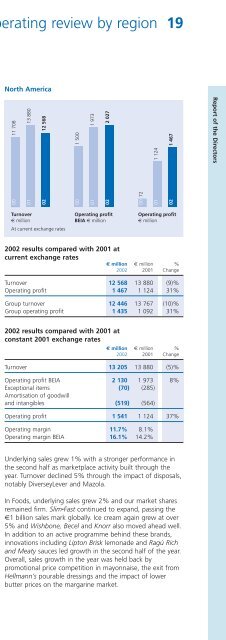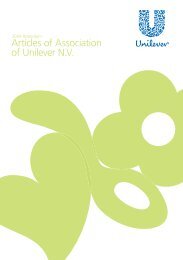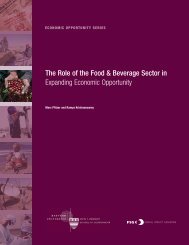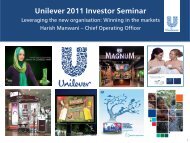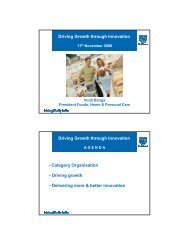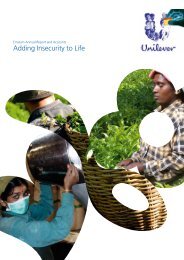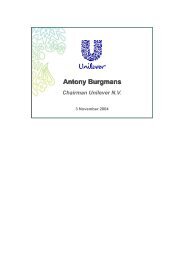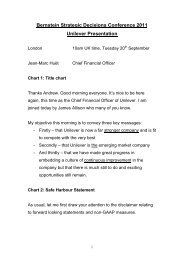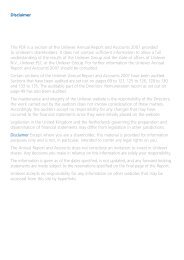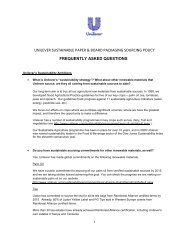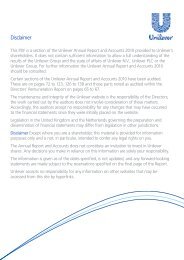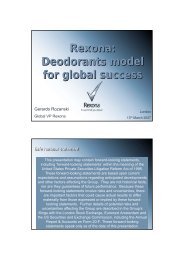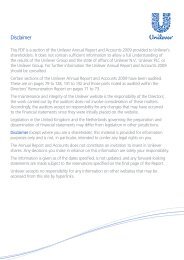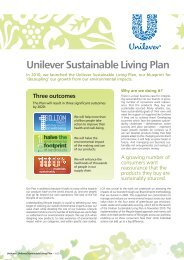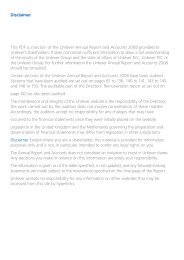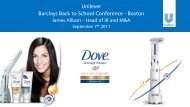Report & accounts 2002 in full - Unilever
Report & accounts 2002 in full - Unilever
Report & accounts 2002 in full - Unilever
Create successful ePaper yourself
Turn your PDF publications into a flip-book with our unique Google optimized e-Paper software.
40 F<strong>in</strong>ancial review<br />
• Innovation:<br />
Our growth depends <strong>in</strong> large part on our ability to<br />
generate and implement a stream of consumer-relevant<br />
improvements to our products. The contribution of<br />
<strong>in</strong>novation is affected by the level of fund<strong>in</strong>g that<br />
can be made available, the technical capability of the<br />
research and development functions, and the success<br />
of operat<strong>in</strong>g management <strong>in</strong> roll<strong>in</strong>g out quickly the<br />
result<strong>in</strong>g improvements.<br />
• Economic conditions <strong>in</strong> develop<strong>in</strong>g countries:<br />
About a third of <strong>Unilever</strong>’s sales come from the group of<br />
develop<strong>in</strong>g and emerg<strong>in</strong>g economies. These markets are<br />
also an important source of our growth. These economies<br />
are more volatile than those <strong>in</strong> the developed world,<br />
and there is a risk of downturns <strong>in</strong> effective consumer<br />
demand that would reduce the sales of our products.<br />
• Borrow<strong>in</strong>gs:<br />
The Group had borrow<strong>in</strong>gs totall<strong>in</strong>g €20 444 million<br />
at the end of <strong>2002</strong>. Any shortfalls <strong>in</strong> our cashflow<br />
commitments to service these borrow<strong>in</strong>gs could<br />
underm<strong>in</strong>e our credit rat<strong>in</strong>g and overall <strong>in</strong>vestor<br />
confidence. Market, <strong>in</strong>terest rate and foreign exchange<br />
risks to which the Group is exposed are described on<br />
page 39.<br />
• Price volatility of raw materials:<br />
<strong>Unilever</strong>’s raw materials cover a wide range of agricultural<br />
and m<strong>in</strong>eral products that are subject to movements <strong>in</strong><br />
cyclical commodity prices. There may be times when<br />
<strong>in</strong>creases <strong>in</strong> these prices cannot be recovered <strong>full</strong>y <strong>in</strong><br />
sell<strong>in</strong>g prices due to competitor actions or weakness<br />
<strong>in</strong> effective consumer demand.<br />
• Reputation:<br />
<strong>Unilever</strong> has a good corporate reputation and many of<br />
our bus<strong>in</strong>esses, which operate <strong>in</strong> around 100 countries<br />
around the world, have a high profile <strong>in</strong> their region.<br />
<strong>Unilever</strong> products carry<strong>in</strong>g our famous brand names are<br />
sold <strong>in</strong> over 150 countries. Should we fail to meet high<br />
product safety, social, environmental and ethical standards<br />
<strong>in</strong> all our operations and activities, <strong>Unilever</strong>'s corporate<br />
reputation could be damaged, lead<strong>in</strong>g to the rejection<br />
of our products by consumers, devaluation of our brands<br />
and diversion of management time <strong>in</strong>to rebuild<strong>in</strong>g our<br />
reputation. Examples of <strong>in</strong>itiatives to manage key social<br />
and environmental risks are mentioned on pages 11<br />
and 12.<br />
• Customer relationships:<br />
Sales to large customers or sales via specialised<br />
distribution channels are significant <strong>in</strong> some of our<br />
bus<strong>in</strong>esses. The loss of a small number of major<br />
customers or a major disruption of a specialised<br />
distribution channel could have an adverse effect<br />
on the Group’s bus<strong>in</strong>ess and results of operations.<br />
<strong>Unilever</strong> Annual <strong>Report</strong> & Accounts and Form 20-F <strong>2002</strong><br />
• Develop<strong>in</strong>g our managers:<br />
<strong>Unilever</strong>’s performance requires that it have the right<br />
calibre of managers <strong>in</strong> place. We must compete to<br />
obta<strong>in</strong> capable recruits for the bus<strong>in</strong>ess, and then tra<strong>in</strong><br />
them <strong>in</strong> the skills and competencies that we need to<br />
deliver growth.<br />
• Our brands:<br />
A key element of our Path to Growth strategy is the<br />
development of a small number of global, lead<strong>in</strong>g brands.<br />
Any adverse event affect<strong>in</strong>g consumer confidence or<br />
cont<strong>in</strong>uity of supply of such a brand would have an<br />
impact on the overall bus<strong>in</strong>ess.<br />
In addition, as a mult<strong>in</strong>ational group, <strong>Unilever</strong>’s bus<strong>in</strong>esses<br />
are exposed to vary<strong>in</strong>g degrees of risk and uncerta<strong>in</strong>ty<br />
related to other factors <strong>in</strong>clud<strong>in</strong>g competitive pric<strong>in</strong>g,<br />
consumption levels, physical risks, legislative, fiscal, tax and<br />
regulatory developments, terrorism and economic, political<br />
and social conditions <strong>in</strong> the environments where we<br />
operate. All of these risks could materially affect the Group’s<br />
bus<strong>in</strong>ess, our turnover, operat<strong>in</strong>g profit, net profit, net assets<br />
and liquidity. There may also be risks which are unknown to<br />
<strong>Unilever</strong> or which are currently believed to be immaterial.<br />
Total Shareholder Return<br />
Total Shareholder Return (TSR) is a concept used to compare<br />
the performance of different companies’ stocks and shares<br />
over time. It comb<strong>in</strong>es share price appreciation and<br />
dividends paid to show the total return to the shareholder.<br />
The absolute level of the TSR will vary with stock markets,<br />
but the relative position reflects the market perception of<br />
overall performance relative to a reference group.<br />
The Company calculates TSR over a three-year roll<strong>in</strong>g period.<br />
This period is sensitive enough to reflect changes but long<br />
enough to smooth out short-term volatility. The return is<br />
expressed <strong>in</strong> US dollars, based on the equivalent US dollar<br />
share price for NV and PLC. US dollars were chosen to<br />
facilitate comparison with companies <strong>in</strong> <strong>Unilever</strong>’s chosen<br />
reference group.<br />
<strong>Unilever</strong>’s TSR target is to be <strong>in</strong> the top third of a reference<br />
group of 21 <strong>in</strong>ternational consumer goods companies on a<br />
three year roll<strong>in</strong>g basis.<br />
At the end of 2001 we were positioned 15th and dur<strong>in</strong>g<br />
<strong>2002</strong> we rose to 12th, outside our target position which<br />
rema<strong>in</strong>s the top third of our reference group. This position is<br />
<strong>in</strong>fluenced by the decl<strong>in</strong>e <strong>in</strong> the share price <strong>in</strong> the latter part<br />
of 1999. On a one year basis, our TSR has been <strong>in</strong> the top<br />
third of the reference group for each of the last two years.


